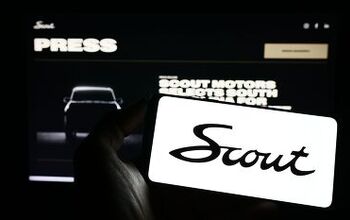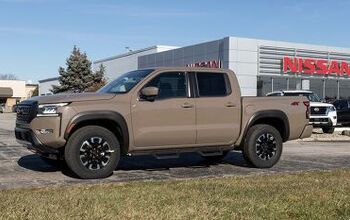Trade War Watch: Mazda Joins Toyota in Condemning U.S. Tariff Proposals

Automakers are not thrilled with the White House’s current interest in automotive tariffs. With factories scattered across the globe, no major manufacturer would go untouched by the proposed increases in import duties or the retaliatory tariffs foreign governments may issue in response.
There’s a lot to lose from a financial perspective. According to a recent analysis from Evercore ISI, Fiat Chrysler would take an annual hit of $866 million if the United States placed a 25-percent import tariff on cars. Considering that other automakers stand to lose at least that much, it’s unsurprising they’ve begun raising their corporate voices over the matter.
Granted, the FCA example is a worst-case scenario for that particular brand, but even a lesser tariff would see a profit loss of hundreds of millions. For an automaker like Mazda, the loss would be far worse.
Automakers have begin making a stink about this. The Association of Global Automakers, a Washington-based trade group representing car manufacturers and parts suppliers, called the United States’ tariff proposal “the greatest threat to the U.S. automotive industry at this time.”
Toyota has already submitted comments to the Commerce Department rejecting the tariff proposals. “A 25 percent tariff on automotive imports, which is just a tax on consumers, would increase the cost of every vehicle sold in the country. Even the Toyota Camry, the best-selling car in America, made in Georgetown, Kentucky, would face $1,800 in increased costs,” Toyota said.
According to Bloomberg, Mazda followed up with statements of its own on Thursday. It asked the department to “reject the premise that auto imports are a threat to national security,” while simultaneously issuing a reminder that it employs 32,000 Americans citizens who work for Mazda via the brand’s dealerships.
The company doesn’t employ factory workers in the country because it doesn’t manufacture vehicles inside the U.S. Until it manages to finish its factory in Alabama, all of Mazda’s products have to be imported and, because of that, its entire lineup would be subject to import fees.
“A tariff is a tax and it will be paid by American consumers,” Mazda said. “It will significantly increase the cost of every new vehicle sold in America, regardless of where it is built.”
Presumably, the Commerce Department knows what’s at stake already. It keeps track of the total value of imported vehicle’s every single year and there is a lot of money tied up. Almost $40 billion dollars worth of car came into the United States from Japan alone last year.
[Image: Mazda]

A staunch consumer advocate tracking industry trends and regulation. Before joining TTAC, Matt spent a decade working for marketing and research firms based in NYC. Clients included several of the world’s largest automakers, global tire brands, and aftermarket part suppliers. Dissatisfied with the corporate world and resentful of having to wear suits everyday, he pivoted to writing about cars. Since then, that man has become an ardent supporter of the right-to-repair movement, been interviewed on the auto industry by national radio broadcasts, driven more rental cars than anyone ever should, participated in amateur rallying events, and received the requisite minimum training as sanctioned by the SCCA. Handy with a wrench, Matt grew up surrounded by Detroit auto workers and managed to get a pizza delivery job before he was legally eligible. He later found himself driving box trucks through Manhattan, guaranteeing future sympathy for actual truckers. He continues to conduct research pertaining to the automotive sector as an independent contractor and has since moved back to his native Michigan, closer to where the cars are born. A contrarian, Matt claims to prefer understeer — stating that front and all-wheel drive vehicles cater best to his driving style.
More by Matt Posky
Latest Car Reviews
Read moreLatest Product Reviews
Read moreRecent Comments
- Jeff “So, the majority of our products are either ICE vehicles or intended to utilize those multi-energy platforms that we have. This is a great opportunity for us, compared to our peers, having the multi-energy platforms for all of our products in development and having the agility to move between them,” she said. From what is stated about the next generation Charger it will be released as a 2 door EV and then as a 4 door with the Hurricane turbo straight 6. I assume both the 2 door and 4 door is on the same platform.
- Brendan Duddy soon we'll see lawyers advertising big payout$ after getting injured by a 'rogue' vehicle
- Zerofoo @VoGhost - The earth is in a 12,000 year long warming cycle. Before that most of North America was covered by a glacier 2 miles thick in some places. Where did that glacier go? Industrial CO2 emissions didn't cause the melt. Climate change frauds have done a masterful job correlating .04% of our atmosphere with a 12,000 year warming trend and then blaming human industrial activity for something that long predates those human activities. Human caused climate change is a lie.
- Probert They already have hybrids, but these won't ever be them as they are built on the modular E-GMP skateboard.
- Justin You guys still looking for that sportbak? I just saw one on the Facebook marketplace in Arizona


































Comments
Join the conversation
BAFO’s in Calcutta today. He’s looking at a cherry Tata Nano he found in the AutoTrader.
I think Toyota may have just shot itself in the foot by stating that tariffs would increase the price of a Camry by 1,800 dollars. This lends further credence to the argument that Toyota's plants in the U.S. are simply low-value-added assembly plants and not manufacturing plants, since most of the important high-value-added components are imported to the U.S. from Toyota's factories in Japan. A big criticism of Japanese automakers in America has always been that most of the Japanese cars sold there as "American made" have in fact very little in way of American content. This is detrimental to the U.S. economy and bad for American workers. According to The Japan Times (Trade heat from Trump makes Toyota’s test in U.S. even tougher, Feb 7, 2017): "Toyota still imports (to America) a significant proportion of high-value components like engines and transmissions, said Takaki Nakanishi, the top-ranked auto analyst for six consecutive years through 2009 in rankings by Nikkei Veritas...“Japan’s auto industry has not sufficiently localized operations in the U.S., its largest sales destination market,” Nakanishi, a Tokyo-based analyst for Jefferies Group LLC, wrote in a Jan. 30 report." In admitting that the price of its "American made" cars will go up significantly if tariffs are imposed, Toyota has in fact bolstered the case for tariffs, since imposition of tariffs will encourage foreign automakers like Toyota to manufacture more of their components in the U.S. This will help American manufacturing and create more high-paying jobs in the U.S.